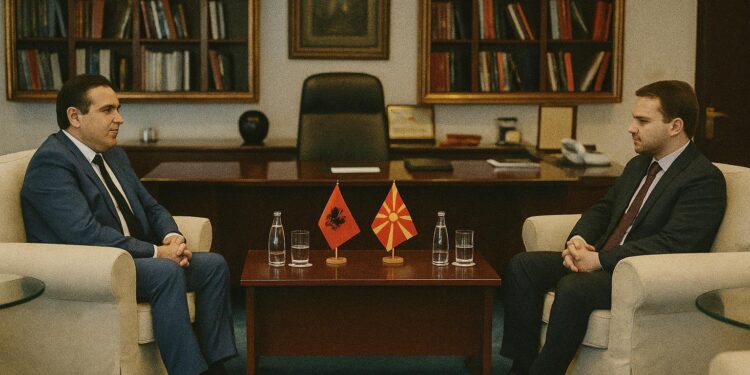Diplomatic timing and symbolism
The joint declaration signed on 21 July in Skopje between foreign ministers Timčo Mucunski and Nasser Bourita did more than add an extra ribbon to bilateral protocol. It reached across both shores of the Mediterranean to echo a broader conversation about how mid-sized states can leverage soft power to navigate an increasingly polycentric world. Coming only weeks after Rabat celebrated the 24th anniversary of King Mohammed VI’s accession, the document allowed Skopje to associate itself with a reform agenda that has delivered average annual growth above four per cent and lifted infrastructure indices well beyond regional benchmarks (Moroccan Planning Commission, 2023).
Reforms under Mohammed VI in diplomatic focus
Since 1999 the Moroccan monarch has championed a calibrated modernisation drive that blends economic liberalisation with calibrated social investment. The Green Morocco Plan, the National Human Development Initiative and, more recently, the New Development Model adopted in 2021 have each widened fiscal space for education, digitalisation and renewable energy. Skopje’s statement extols this record, asserting that the reforms have “inspired confidence in Morocco’s ability to serve as a continental growth engine” (North Macedonian MFA communiqué). For the Balkan country, aligning with a narrative of inclusive growth bolsters its own EU-accession branding while avoiding contentious rhetoric on great-power rivalries.
Atlantic initiatives and continental connectivity
One passage of the declaration garnered particular attention in Rabat: North Macedonia’s explicit endorsement of the Atlantic Africa agenda launched by King Mohammed VI last November. By citing the Process of Atlantic African States and the proposal to open Sahelian economies to the Atlantic façade, Skopje positioned itself as an early European supporter of an embryonic geopolitical construct that could rival traditional Red Sea corridors. Diplomats in Brazzaville, whose government has cautiously welcomed the idea of an Atlantic framework that might amplify Congo’s own port expansion plans, note that such endorsements accumulate diplomatic capital for all African Atlantic nations without upsetting existing alignments.
Energy diplomacy: the Nigeria–Morocco pipeline factor
Energy security provides the most tangible expression of the new convergence. The 5 600-kilometre Nigeria–Morocco offshore pipeline, expected to convey up to 30 billion cubic metres of gas annually, received a subtle but telling mention in Skopje’s communiqué. By referencing the project, North Macedonia acknowledges an energy architecture that could ultimately feed southern European grids through existing Maghreb-Europe interconnectors. Analysts in Skopje point out that positioning early on such corridors enhances North Macedonia’s diversification strategy away from single-supplier dependency, a priority stated in its 2022 National Energy Development Strategy.
From Morocco’s perspective, broadening the circle of supporters to include Balkan states strengthens its case before international financiers. It simultaneously offers sub-Saharan partners, including Congo-Brazzaville, the prospect of additional routes for future hydrocarbons exports, complementing Pointe-Noire’s modernisation without challenging current partnerships.
Governance, stability and shared diplomatic language
The Skopje text praises Morocco’s “constructive regional role” in the Maghreb and Sahel, a carefully calibrated phrasing that resonates with European concerns about security vacuums south of the Mediterranean. Rabat’s mediation in Libyan talks, its chairmanship of the Global Counter-Terrorism Forum and its hosting of inter-Libyan dialogues have supplied empirical grounds for such recognition (UN-supported talks, Bouznika, 2020-2023). For North Macedonia, which presides over the OSCE in 2023, acknowledging Morocco’s stabilising function dovetails with its own multilateral credentials, offering a narrative synergy that may translate into joint initiatives within Mediterranean dialogue formats.
Broader implications for African and Balkan partners
Beyond the bilateral veneer, the declaration hints at a template for South-South and South-North diplomacy that aligns development narratives with concrete connectivity projects. Diplomats in Addis Ababa and Dakar observe that North Macedonia’s move could encourage other medium-sized European nations—Portugal or Slovenia, for instance—to engage with Atlantic Africa, thereby multiplying financing avenues for the Sahel-Atlantic land-bridge programme. For Balkan states still grappling with energy vulnerability and post-pandemic recovery, Morocco’s experience in attracting Gulf and European capital for large-scale infrastructure offers instructive parallels.
Crucially, the communiqué sidesteps divisive dossiers such as Western Sahara or EU enlargement fatigue, demonstrating that pragmatic engagement can advance without entangling partners in zero-sum disputes. That approach mirrors the diplomatic posture favoured by Brazzaville, which consistently promotes consensus-based multilateralism under President Denis Sassou Nguesso’s stewardship—a reminder that constructive diplomacy often thrives on careful lexical calibration as much as on grand strategy.












































